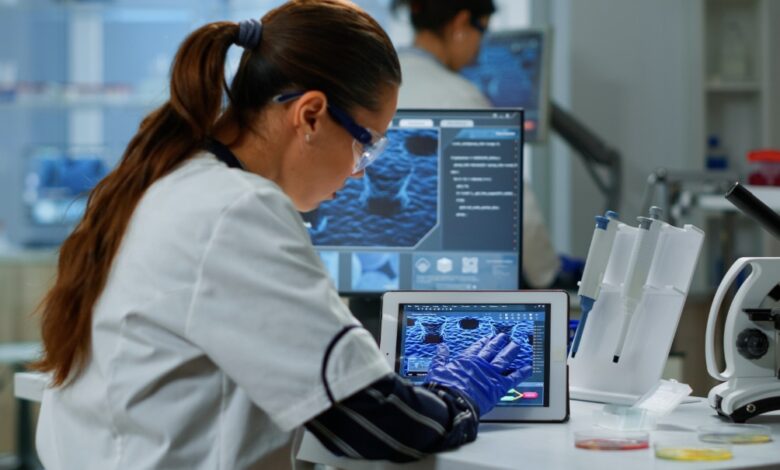How Generative AI Solutions Are Transforming Healthcare Innovation

Artificial intelligence is now widely used in different areas of healthcare and medicine. For instance, pharmaceutical companies use AI in the drug discovery process. One of the latest and most important advancements in the field of AI is commonly known as generative AI. In this post, we will show you how healthcare and medical companies use this branch of AI to improve their services, shorten the time necessary for daily operations, and save costs.
While there are many areas where generative AI actively supports healthcare companies, there are four that come to the fore as the most useful and versatile ones:
- Personalized treatment plans
- Enhanced accuracy
- Virtual healthcare assistants
- Improved accessibility to healthcare services
Let’s have a look at them in more detail.
Personalized treatment plans
Every patient is different, which makes creating “standard” treatment plans a time-consuming activity. The doctor needs to analyze each patient’s symptoms, medical history, diagnosis, and several other elements to come up with a treatment plan that’s tailored to a given patient’s situation. Of course, you can make more general treatment plans that apply to larger populations, not just individual patients, but that’s not always an effective solution.
Thankfully, generative AI streamlines this process, primarily by analyzing patient data on auto-pilot and providing HCPs with the input they need to create accurate treatment plans more effectively. Generative AI can take all the relevant elements into account (and it doesn’t extend the analysis process by much!), such as:
- Medical history
- Genetic information
- Lab results, etc.
To provide doctors with accurate suggestions that are based on each patient’s profile and situation. This is especially useful when standard treatment plans cannot be applied (e.g., because of the allergic reactions to standard medicines), and careful analysis of the given patient’s situation requires more time (that doctors usually don’t have).
The results of such support are obvious; doctors can spend far less time analyzing their patients’ situations and profiles. Additionally, most of the time, the recommendations generated by gen AI are also more accurate.
Improved diagnostic accuracy
Speaking of accuracy, this is where the second application of this technology comes in handy. From time to time, lab results will come as inconclusive. In such a situation, everything relies on the physician’s shoulders to correctly interpret the data and make an informed decision about possible treatments (and whether they should be applied).
This is where generative AI steps in the game. HCPs can use generative AI to improve their diagnostic processes and analyze lab results at scale with ease. We’ve already seen situations where AI-powered tools were more effective at detecting tumors or cancers than human radiologists. Partly, that’s because gen AI tools always work with the same accuracy; they never feel bad and never are tired, which makes their diagnoses more reliable.
Medical professionals use generative AI to analyze and provide recommendations based on medical images (e.g., MRI or X-rays), patient medical history, and other lab results. Moreover, AI can easily combine different data sources to provide a more comprehensive diagnosis.
Virtual healthcare assistants
Chatbots and voicebots are textbook examples of generative AI in action. They provide immediate support 24/7, all year round. Those virtual assistants have found applications in every sector, including healthcare. Nowadays, medical chatbots can communicate with patients to:
- Answer FAQs regarding possible treatment plans
- Schedule appointments
- Conduct initial patient screening
- And more
And thanks to other AI-related technologies, especially NLP (natural language processing) those chatbots can communicate in a natural, human-like manner. Those assistants are no longer rule-based, which means patients are not limited to just lists for two or three options – they can type in their questions just as if they were talking to an actual doctor. And the chatbot can reply in a similar manner.
Additionally, virtual healthcare assistants come in handy when it comes to patients with chronic/long-term diseases. in such a situation, those assistants can literally assist each patient in their treatment, remind them about their medicines and provide real-time advice based on the patient’s state (this is where generative AI can support wearable diagnostic devices).
What’s also fantastic is that patients can always ask follow-up questions or request the VHA (virtual healthcare assistant) to explain possible treatment options in the most straightforward way possible.
Improved accessibility to healthcare services
Lastly, generative AI provides necessary support when it comes to accessibility to healthcare services. This is especially important in countries/areas where healthcare is not so advanced or distributed, and a lot of people struggle with limited access to HCPs.
Under such circumstances, gen AI tools can support people living in such areas with remote diagnostics and healthcare recommendations, virtual consultations with doctors, and even automated health monitoring. Of course, many of those things have been possible even before with telemedicine platforms, but the truth is that generative AI can supercharge those platforms, give them more functionality, and provide patients with more human-like support.
Lastly, gen AI can also provide necessary help when it comes to patients who don’t speak the language (because they moved to a different country or are on vacation) or have to deal with some sort of disability. In many of those cases, generative AI can provide support tailored to the needs of such patients.
Wrapping up
Generative AI is undoubtedly a true game-changer in the healthcare sector. If you are looking to implement gen AI-based solutions in your healthcare facility, you have many options to choose from. In such a situation, it’s best to start with generative AI consulting services, e.g., provided by Addepto https://addepto.com/generative-ai-consulting/. With such a service, you can find out more about possible options and how to implement them effectively.



